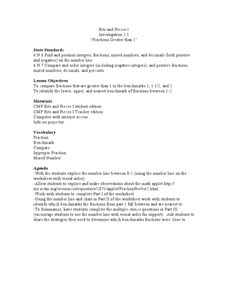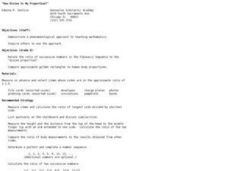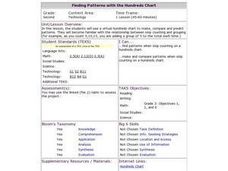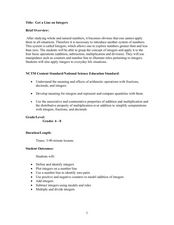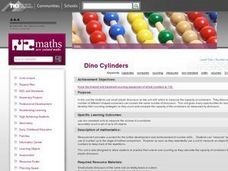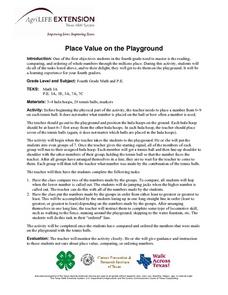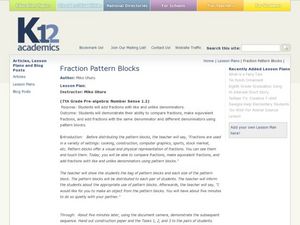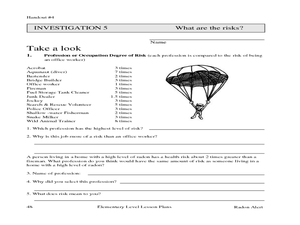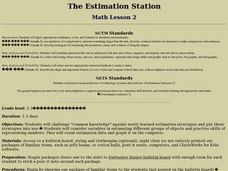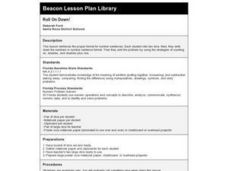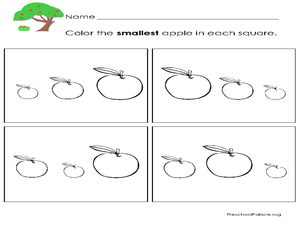Curated OER
Hands On Math Lessons with Technology
Students explore a variety of math concepts. In this integrating technology lesson, students visit online webtools such as Max's Math Adventure, I Know That Math, Hands on Banking, and more. A description of each website is provided.
Curated OER
Number and Number Relations: Lesson 2
Fourth graders participate in using the terminology of more, less, between, compare, and order. They compare whole numbers and use the symbols for <, >, =. They order whole numbers and practice with problems where they use this...
Curated OER
Understanding Fractions
Fourth graders compare fractions by using skittles and m&ms. In this math lesson, 4th graders explore the size of different fractions by cutting pieces of their pie for visual representation. Additionally, students discuss ways to...
Curated OER
Bits and Pieces: Fractions Greater Than One
Students compare fractions. For this fraction worksheet, students examine the number line. Using the Internet, they explore models of numbers greater than one. Students complete multiple-choice worksheets.
Curated OER
Number and Number Relations: Lesson 3
Eighth graders compare whole numbers and decimals. They use symbols for <, >, =, and order whole numbers and decimals. They practice the meaning of positive and nugative integers by using them to describe real-world situations.
Curated OER
"How Divine Is My Proportion?"
Eighth graders explore the concept of the divine proportion/golden ratio. In this Fibonacci Sequence exploratory lesson, 8th graders measure the length and width of various objects to see which items have a divine proportion. Students...
Curated OER
Finding Patterns with the Hundreds Chart
Students review their numbers up to one hundred. Using a chart, they compare and predict patterns that might be in the numbers. They practice skip counting and grouping numbers. Using a spreadsheet, they graph different sets of numbers...
Curated OER
George and Sam Save for a Present
Third graders develop their algebraic thinking by recognizing a variety of patterns using concrete objects, numbers, tables, and pictures. In this George and Sam Save for a present lesson, 3rd graders communicate their mathematical...
Curated OER
Prime Time
Seventh graders practice determining the prime factorization of composite numbers. They create Christmas factor trees for prime numbers greater than 100. They decorate their final products with markers, crayons, colored pencils, glitter...
Curated OER
Get a Line on Integers
Students explore number sense by completing math function problems in class. In this integers lesson, students define integers and practice plotting them on a number line. Students utilize math functions such as addition and...
Curated OER
Dino Cylinders
Students investigate the capacity of containers using small dinosaur figures as the unit of measure. They work with a number of different shaped containers to compare the capacity as they practice counting the dinosaurs. They complete an...
Alabama Learning Exchange
Lining up the Decimals
Fifth graders order decimals from least to greatest and greatest to least. In this decimal order instructional activity, 5th graders complete an online review of comparing 2 digit numbers. Students then complete a decimal order card game...
Curated OER
Place Value on the Playground
Fourth graders explore ordering whole numbers through the millions place through a P.E. game on the playground. In small groups they form numbers while standing in hula hoops, telling the teacher what number was made by the combination...
Curated OER
Fraction Pattern Blocks
Seventh graders practice using pattern blocks. For this pre-algebra lesson, 7th graders complete tasks that require them to compare fractions, make fractions equivalent, and add fractions.
Curated OER
Number Scrolls
Students write the number line. In this numbers lesson, students write numbers in numeric order on a number scroll. They find patterns within this number line.
Curated OER
Measuring to the Nearest Inch
Third graders use whole numbers and fractions to make connections between abstractions of the mathematical world and the real world. In this fractions and measurement lesson, 3rd graders identify, quantify groups , and measure distances....
Curated OER
Comparing and Ordering Fractions
Students practice ordering fractions. In this fractions lesson, students determine how to tell when a fraction is close to 1, 1/2 and other various fractions. Students use benchmarks to order fractions.
Curated OER
Money for starters
Students compare the values of coins and paper money. They read prices, read and write any 2-digit number. They model and explain addition calculations with a sum of up to 20.
Curated OER
Worksheet Chapter 1, 1.2-1.8 College Prep Algebra
In this algebra worksheet, students complete a variety of basic algebra problems. They compare integers, identify sets of numbers, simplify equations, translate words into numerical expressions, and identify properties. This worksheet...
Curated OER
Radon Alert: Understanding Odds
In this radon alert: understanding odds worksheet, 5th graders predict results of rolling dice and record data in a chart, then compare odds of events and occupations, then compare that with radon exposure.
Curated OER
Square Roots, Number Classification, Ordering & Graphing
Ninth graders identify numbers as rational or irrational. Using calculators estimation, and factoring methods, 9th graders compute the square root of numbers. They graph numbers in sequential order and round numbers integers to the...
Curated OER
The Estimation Station
Students challenge "common knowledge" against newly learned estimation strategies and put those strategies into use. They consider variables in estimating different groups of objects and practice skills of representing numbers.
Curated OER
Roll On Down!
Students create number sentences by rolling two dice. Each student rolls the dice and writes down the numbers in number sentence format. Then they add the problem by using the strategies of counting on and doubles.
Curated OER
Finding the Smallest Apple
In this finding the smallest apple worksheet, students look at the pictures in four boxes, then color the smallest apple in each one.





